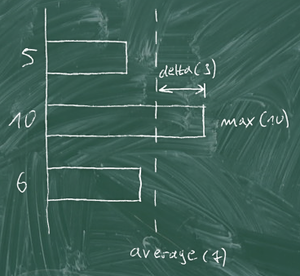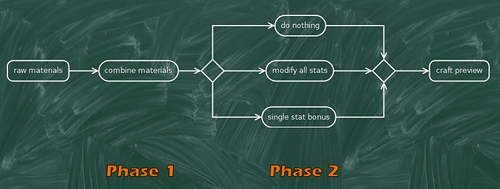From EncyclopAtys
(Created page with "<br /> <br /> <center><big><big><big>'''Crafting and Math'''</big></big></big></center> <br /> <br /> <span style="color:Crimson;">Big spoiler alert! The following article co...") |
(No difference)
|
Revision as of 13:30, 25 November 2020
Big spoiler alert! The following article contains a step by step guide to recreate and understand the crafting mechanics of the game. While all of this information is available to the public via the game’s source code, it is still a mystery to many. If you want to keep this mystery, don't read on!
This article explains how to get from individual raw materials to the stats shown in the craft preview window. A big thanks to all who helped in the creation of this article and to robplus for editing.
0. Definitions
We need to agree on the following three things to talk about crafting. To quote my favorite character from another game: "Numbers, Numbers, Math, Math, Math!"
- Average
- Sum up the given numbers and divide the sum by their count.
- Maximum
- The largest number in a set is called maximum.
- Delta
- The difference between two numbers is called a delta value. (It can also be negative, depending on the perspective.)
1. Theory
There have been some myths about the crafting mechanic floating around the community. Let us begin with some facts:* Crafting is the same for all items, plans and recipes. A magic amplifier is processed in the same way as a long axe.
- Neither individual materials nor specific item parts influences the crafting mechanic; they are all equal. Only the result of all combined materials has an impact.
- Raw materials don't have any hidden stats.
- The origin of a raw material does not matter. A piece of excellent forest beng amber is equal to its prime roots counterpart.
Crafting in general happens in two phases, these are:
- calculate the values for the individual item stats based on the used raw materials;
- apply a stretch or a bonus to these values, if applicable.
We are going to use a magic amplifier recipe as an example and have a look at a light armor recipe in the second phase as well. The recipes are as follows:
- Basic Quality Magic Amplifier
- 5x Basic Mitexi,
- Bark5x Basic Shu Fiber,
- 10x Choice Zun Amber.
- Basic Quality Light Boots
- 2x Choice Shu Fiber,
- 2x Choice Moon Resin,
- 1x Choice Gulatch Oil,
- 1x Choice Visc Sap.
Phase 1, calculate the values for the individual item stats
To calculate the values for each stat of the resulting item, every single material contributing to this stat has to be taken into account. The first stat is durability and it appears in all 3 materials with different values. 5x basic mitexi bark for shaft, with a durability of 05x basic dzao fiber for grip, with a durability of 2010x choice zun amber for magic focus, with a durability of 30The amount of materials used and their actual value for durability has to be taken into account for the calculation. For our magic amplifier the average durability value is:
(5x0 + 5x20 + 10x30) divided by (5+5+10) = 400 / 20 = 20
The other stats are calculated in the same way. Take care not to include materials which don't contribute to a stat in the resulting item! Damage, for example, is only influenced by the shaft material. Neither grip nor magic focus contribute to damage in any way. The resulting stat is calculated like this:
(5x 0) divided by 5 = 0
If we repeat this for all stats, the resulting stats for our magic amplifier look like this:
20 Durability
35 Lightness
50 Sap Load
0 Damage
20 Speed
40 Dodge Modifier
20 Parry Modifier
40 Adversary Dodge Modifier
10 Adversary Parry Modifier
50 Elemental Cast Speed
50 Elemental Power
50 Offensive Affliction Cast Speed
50 Offensive Affliction Powe
r30 Defensive Affliction Cast Speed
50 Defensive Affliction Power
50 Heal Cast Speed
50 Heal Power
Phase 1 ends here. The stats look quite different from the values shown in the item preview window, we will address this issue in phase 2.





